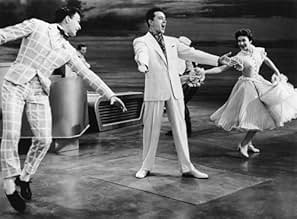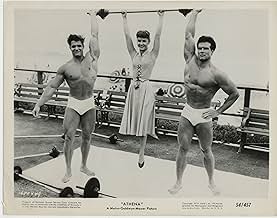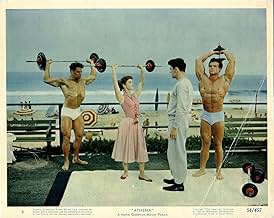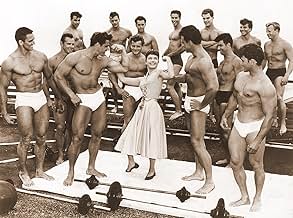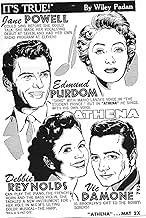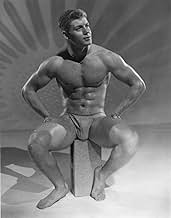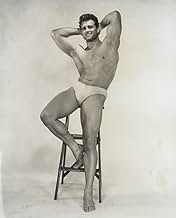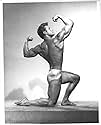Dos hermanas se enamoran y están listas para casarse, pero su padre no acepta a los pretendientes por considerarlos poco desarrollados físicamente.Dos hermanas se enamoran y están listas para casarse, pero su padre no acepta a los pretendientes por considerarlos poco desarrollados físicamente.Dos hermanas se enamoran y están listas para casarse, pero su padre no acepta a los pretendientes por considerarlos poco desarrollados físicamente.
- Dirección
- Guionistas
- Elenco
- Ed Perkins
- (as Steve Reeves "Mr. Universe" of 1950)
Opiniones destacadas
The premiere member of this elite group was a former Mr. Universe--the dark, statuesque Steve Reeves. Before the days when he was sporting a leather loincloth, chained at the wrists, tensing his biceps, and literally bringing the house down, Reeves was introduced for the public's delectation in the 1954 musical "Athena." In it, he plays Ed Perkins, the prize stallion of a stable of physical culturalists groomed by the barrel-chested Louis Calhern--handlebar moustache, bluster and all--as Ulysses Mulvain, a septagenarian who espouses to a neo-Spartan approach to life, replete with vegetarian diet, and plenty of fresh air and exercise. Reeves vies for the affection of the title character, Mulvain's granddaughter (Jane Powell), who, much to the chagrin of the "stars," has eyes for a stuffy, young lawyer (played by the impossibly handsome Edmund Purdom--if there ever was an actor with a silky-milky-white complexion, it's him), himself being primed and tweaked for a U.S. senate seat. Reeves settles for a supporting role in his first major outing on the screen and sits on the sidelines while Powell charts her inevitable course with Purdom glowering at her incessantly. The body beautiful has his big scene with taking the title at a re-creation of the Mr. Universe contest that for insiders must have seemed pretty hokey.
That aside, if you're willing to go with it, "Athena" can be fun--a kind of stilted mixture of numerology, prurient interest, and music--all served up by the not-so-discerning minds of writers William Ludwig ("The Student Prince"), Leonard Spigelgass, and the by-then renowned songwriting team of Hugh Martin and Ralph Blane. Their classic "The Boy Next Door" changes sex with Vic Damone singing it, and their "Love Can Change The Stars" is just syrupy enough for the sweet tooths of hopeless romantics. (My favorite is the spry "I Never Felt Better.") But none of these compares with the grandeur of blazingly blonde Powell's rendition of "Chacun Le Sait" from Donizetti's "La Fille du Regiment." It's full of passion and indignation and fire, and Powell has never achieved so high a note of glory on screen as she has in these few much-too-short minutes.
Also on the sidelines--Debbie Reynolds as Athena's sister Minerva, and, descending from the clouds of Hollywood movie mysticism, Evelyn Varden as Salome Mulvain, grandmother of the nymphs, greeting everyone with something that sounds like "Namari gongo par" and coming out trances every so often to bestow upon her loved ones the will of the stars.
This 60+ year old film humorously but respectfully presents the Southern-California health culture of the mid-1950's, that was still considered by many to be way-out and crazy - including vegetarianism, strenuous exercise, bikes vs. Cars, and body building.
The songs by Hugh Martin and Ralph Blaine are fantastic, including the lovely "Love Can Change the Stars", with its wonderful, unusual rhymes, and "I Never Felt Better," an energetic number headlined by Debbie Reynolds and Powell, and choreographed (as is the whole film) by Valerie Bettis.
Another great tune is Vocalize, first sung by Jane as she mulches some peach trees, and reprised several times.
The bodybuilders (Steve Reeves, Richard DuBois, et al) mostly come off as jerks, which I guess was necessary to the plot, so that the "regular" guys can get the best of them, but it's a bit unfair. By the end of the film there's harmony between all parties - not really adequately explained, but hey, it's not War And Peace, it's just an MGM musical, and a fun one.
Edmund Purdom is handsome, quietly charming, and appropriately stiff as the lawyer who loves Athena, but when he's supposed to be loosening up, well, he's still maybe a bit stiff. Vic Damone, in the second lead, plays a TV crooner who woos Debbie and has a couple of numbers to showcase his superb skills, including a reworking of "The Boy (Girl) Next Door" from Meet Me In St. Louis, and "Venezia," which has nothing to do with the plot (it's sung in a nightclub act) but is another terrific song by Martin-Blaine. The lovely and very talented Jane also gets to sing the obligatory classical piece (from Donizetti's "Daughter Of The Regiment") and really sells it. All in all, the musical interludes are legit, and make the picture one of the more truly enjoyable MGM musical shows.
The supporting actors in the film are great, especially Louis Calhern as the 78 year old grandfather who can still do gymnastics (Calhern was actually in his late 50's); Evelyn Varden ("I love you, let us be friends") as Grandma, who communes with a spirit called Narda; Ray Collins, Carl Benton Reid, and Howard Wendell as the three older law partners urging Purdom to maintain his dignity; the wonderful Kathleen Freeman as Purdom's stuffy secretary (who starts out eating chocolates and winds up munching on a raw carrot); and the subtly bitchy Linda Christian, who is so good as Athena's blue blood adversary you somehow can't quite hate her as much as you should. Also in the cast are the lovely actress-singer Virginia Gibson, as well as talented Nancy Kilgas, both of whom were also in "Seven Brides For Seven Brothers" (1954) with Jane. Also delightful is Henry Nakamura (you may remember him from "Westward The Women", or "Go For Broke") as Purdom's houseboy, who informs his boss that Powell speaks Japanese with a Spanish accent.
The settings are imaginative and expertly realized, especially the modernistic hilltop home of the Mulvains, and the vocal, orchestral and choral arrangements are fantastic.
There is just something fresh and likable about the movie, its setting, characters, tunes, and dances. Sadly, the era of the MGM musicals was on the wane when this one was made. Jane Powell's film career didn't survive her departure from the studio, though Debbie Reynolds became an even bigger star over then next ten years.
On a completely different front, it was the lack of tuneful, memorable original scores that began to kill the movie musical in the 1950s and the exceptions were few: ROYAL WEDDING, CALAMITY JANE, GENTLEMEN PREFER BLONDES, SEVEN BRIDES FOR SEVEN BROTHERS, GIGI, then much later, THOROUGHLY MODERN MILLIE. Can you think of others? Those that were as good or better were either revues of old song catalogs (SINGING IN THE RAIN, THE BAND WAGON) or else were filmed versions of hit Broadway shows. On the other hand I LOVE MELVIN, HIT THE DECK, LUCKY ME, TWO TICKETS TO Broadway, Texas CARNIVAL, GIVE A GIRL A BREAK, SMALL TOWN GIRL, THE GIRL NEXT DOOR, THE GIRL MOST LIKELY, THE GIRL RUSH and others like them presided over the slow death of a great film genre. Blane and Martin's score for ATHENA isn't top notch, but it's good and it deserves to be better known than it is.
Then we have the coded gay sensibility that slumbers in every film musical but occasionally awakens in '50s Hollywood in the 'Is There Anyone Here For Love?' number in GENTLEMEN PREFER BLONDES, in the 'Put 'Em Back' number from L'IL ABNER and throughout ATHENA, which even has an appearance by physique god and gay icon Steve Reeves, along with a gaggle of other adorable, glossy-haired muscle studs who were almost certainly gay to a man (for the right price, anyway). Somehow, ATHENA weaves these various skeins in a way that is simultaneously entertaining and mind-blowing, awful yet kinda terrific. All this and Jane Powell and Debbie Reynolds in the same picture.
Which turns out to be revealing. Jane Powell was always pretty, peppy and efficient, and I've always preferred her operetta-style singing voice to those of Jeanette MacDonald, Deanna Durbin or Kathryn Grayson. And yet more than some others, this role reveals a certain detachment, a lack of affect. Having now watched six or eight Powell films over a short period (via the Universite de TCM), it gradually dawned on me that for all her niceness and professionalism she never really seems to connect to her material, her surroundings or her co-stars. Did she ever make you believe she was Walter Pigeon's daughter? George Brent's? Fred Astaire's sister? Or that she was in love with Peter Lawford, Cliff Robertson or (in this picture) Edmund Purdom? It's as if she's starring in a film in her own head where the other actors are her creations. Compare her to Debbie Reynolds here, whose talent and personality seem so much more engaged and energetic -- this may be a construction (Debbie was an ambitious and hard-working gal) but she is more immediate, more alive than Powell, and she effortlessly steals the 'I Never Felt Better' number out from under Janie, making it the best in the film.
Need more reasons to check out this curious and curiously enjoyable musical? Well, there is the very handsome Edmund Purdom, whose stiffness is for once used well in a film, and who manages, in his sly, quiet way to be very sexy and charming. Then there is dishy, bitchy Linda Christian, who loses Edmund to Jane, but who is so much more believable as his consort. As she must have seemed in real life: after husband Tyrone Power died, she briefly married Purdom. And then there's the fact reported by Esther Williams in her memoir "Million Dollar Mermaid" that she and Charles Walters originally dreamed up ATHENA as a swimming musical for her. Do seek it out. It's not entirely successful, even on its own terms, but it's worth a look.
¿Sabías que…?
- TriviaWhen the daughter of Italian director Pietro Francisci saw this film, she suggested bodybuilder-turned-actor 'Steve Reeves' for the title role in her father's upcoming production Le fatiche di Ercole (1958) (US title: "Hercules").
- ErroresRight before Debbie Reynolds and Vic Damone go into the musical number in the health store, the microphone shadow passes over the cardboard cutout of the counter top muscle man advertising Viatalo.
- Citas
Adam Calhorn Shaw: You earned $300,000? Now, let's start from the beginning, just what did you do to earn all this money?
Johnny Nyle: I sing in television, radio, records, night clubs.
Adam Calhorn Shaw: You get all that money singing?
Johnny Nyle: I guess you wouldn't call it singing. I'm a - a crooner.
Adam Calhorn Shaw: There ought to be a law against that.
Selecciones populares
- How long is Athena?Con tecnología de Alexa
Detalles
- Tiempo de ejecución1 hora 35 minutos
- Relación de aspecto
- 1.75 : 1
Contribuir a esta página



